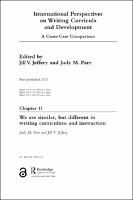Chapter 11 We are similar, but different in writing curriculum and instruction
Proposal review
Author(s)
Parr, Judy
Jeffery, Jill
Language
EnglishAbstract
Here we present our analyses and inferences arising from the data in the cases, representing countries whose educational systems are diverse: Chile, Denmark, Germany, Hong Kong, New Zealand, Norway, England, the United States and Uzbekistan. The synthesis highlights patterns of similarities and differences in their curricula and instruction in writing. We identified themes under three broad dimensions: social and contextual factors that shape writing curricula; the discourses of writing reflected in curricula and official documents; and hallmarks of classroom practice, including the relationship with official discourse. Themes included a trajectory towards accountability and outcomes-based educational reform to address perceived under-performance in writing; a range in the extent of flexibility in implementing curricula, linked to notions of teacher professionalism; common curricula discourse of skills, process and genre; limited robust data on writing; narrow constructs of competence in writing in some countries' standards and assessments; non-empirically based development of writing standards; detrimental influence of high-stakes assessments; and evidence of a disjuncture between curriculum statements about writing and assessment, and between curricula and actual implementation. In almost no cases did curricula specify the nature of writing instruction. However, research on writing instruction in classrooms was limited in several countries.
Keywords
writing studies, writing development, cross-national writing research, school writing, curricular analysis, curriculum, assessment tools, national educationISBN
9780367508142, 9780367508166, 9781003051404Publisher
Taylor & FrancisPublisher website
https://taylorandfrancis.com/Publication date and place
2021Imprint
RoutledgeClassification
Education


 Download
Download Web Shop
Web Shop